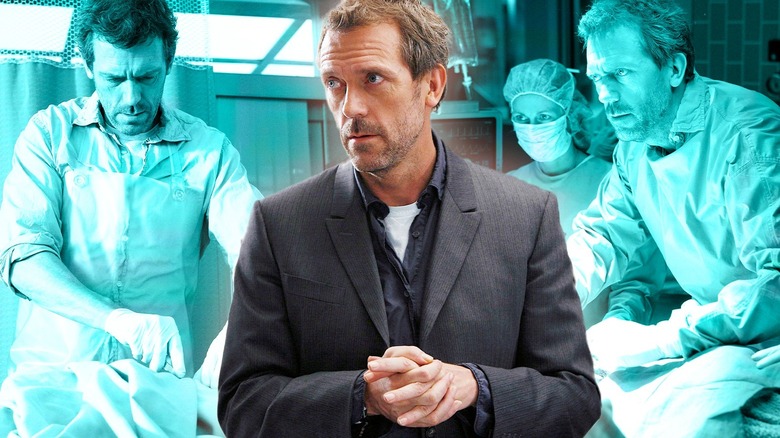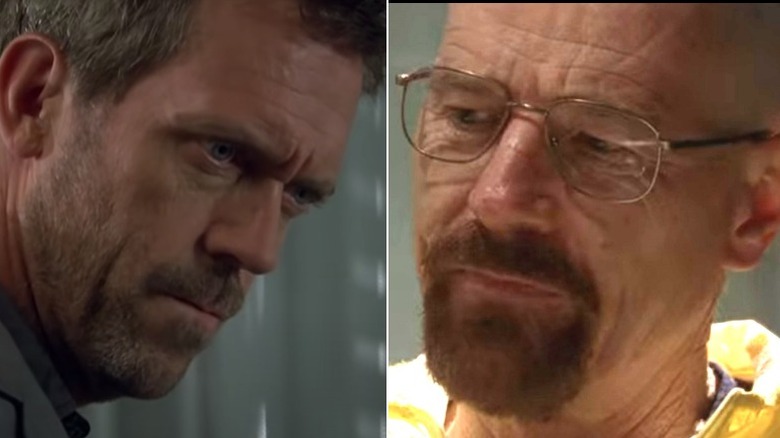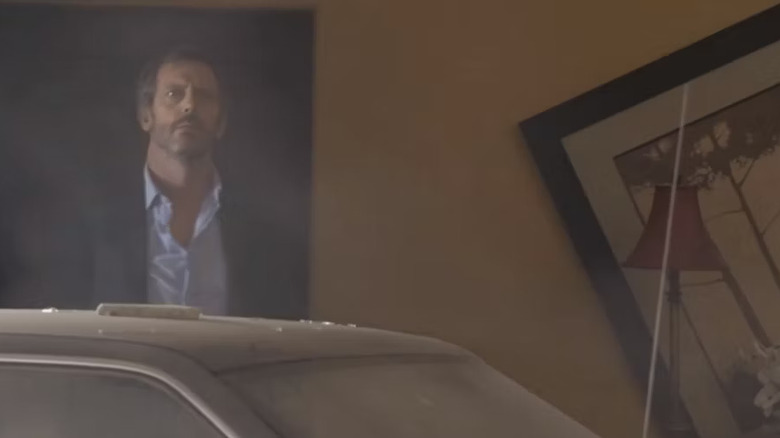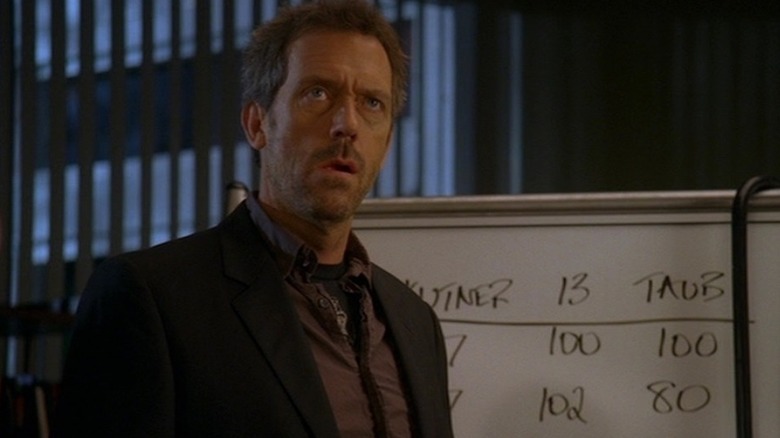House, M.D. Was Once The Most Popular Show In The World. Why Does Nobody Talk About It Anymore?
Here's a statement that you might find hard to believe: "House, M.D." was once the most popular show in the world. In fact, per Entertainment Weekly, in the good year 2009 the edgy medical drama reigned supreme with a global viewership of 81.8 million pairs of eyes, spread over 66 different countries.
It's not a massive surprise, either, if you remember what a phenomenon the show was back in the day. In many ways, "House, M.D." is a perfect storm that combines medical drama with prestige-level storytelling and characters, and its cast is one for the ages. On paper, the series ticks all the boxes for an all-time great show, to the point that it even has a killer theme song with a story of its own.
You'd think that a show of such stature would have left a pretty significant mark in people's minds, especially with its stellar Tomatometer and audience scores on Rotten Tomatoes. Yet, the untold truth of "House, M.D." often revolves around its main character, instead of the show itself. There are tales about the way people have mistaken the incredibly British Hugh Laurie for an American, and how Laurie himself looked bemusedly on as his role as the titular mean doctor turned the career comedian into a bona fide sex symbol. As for other aspects of the series ... well, at this point, if you mention "House, M.D." in a casual TV show conversation, someone might bother cracking a joke about lupus before the conversation moves to "The Wire" or "Sopranos."
So, what exactly went wrong? Why doesn't "House, M.D." continue to dominate pop culture conversations the way "Mad Men," "Breaking Bad" and other huge shows from the same era do? Let's take a look.
House, M.D. is the anti-Breaking Bad, and Dr. House is the anti-Walter White
Speaking of "Breaking Bad," AMC's meth kingpin drama is easily one of the most perfect TV shows ever made. It also shares enough similarities with "House, M.D." to warrant comparison. Both shows have a great cast, a central character that oozes gravitas, and a fascinating premise that explores science, ethics, and addiction. However, they also have a few marked differences, which may explain why only one of them has cemented its place in the annals of history.
"Breaking Bad" embraces change. Over time, Walter White (Bryan Cranston) wholly gives in to his darkest nature — initially because he feels that he has no other options, but ultimately because he enjoys it. Just like every other major character in his show, he evolves and actively reacts to the circumstances around him.
The same should be the case with Dr. Gregory House, a character that's seemingly custom designed for a big ol' character arc. Unfortunately, he happens to star in the show that at some point decided to go all in with its "people don't change" premise. With enough "House M.D." under your belt, you pretty much know what you'll get. Patients always lie; It's (almost) never lupus; and House can never have a meaningful long-term arc that doesn't end with him reverting back to his core self, undoing any interesting developments. The show can (and does) slap him with work troubles, mental facilities and prisons, but the House that rides into the sunset with Wilson (Robert Sean Leonard) is still the same lovably horrible misanthrope that treated Robin Tunney's Rebecca Adler in Season 1.
Because of this, the change in "House M.D." rarely seems impactful. They could easily revive the show today, and have House work in some other facility under an assumed name, with the exact same attitude and habits. As for Walter White ... well, his arc was so conclusive that they had to take his show's goofiest character and create an entirely different gut-wrenching critical darling series to further explore the universe.
House, M.D. became an overlong series with alienating narrative choices
There's a sweet spot to how long a great TV show should last, and the tricky thing is that it varies from show to show. "The Wire?" Does exactly what it needs to do in five seasons. Any Dick Wolf show? Double digits or bust. "House M.D.?" Uh ... three, maybe four seasons less than what we actually got.
With eight seasons, "House M.D." is long. Sure, the vast majority of it is basically a case-of-the-week procedural with not-so-subtle Sherlock Holmes undertones — a tactic that could potentially sustain an even lengthier run. Then again, because "House, M.D." sticks by its "no one can truly change" ethos, you could say that the 177-episode series is ultimately even more about nothing than "Seinfeld." That's not a particularly alluring concept for a rewatch marathon.
All right, that may not be an entirely fair assessment, because things do happen in the "House, M.D." universe. Unfortunately, the show's biggest hard-hitting beats tend to leapfrog over an entire family tree of sharks. When Dr. House himself tackles his many issues in a lengthy, moving arc, it's soon undermined with a comedic relapse that involves him crashing a car into Dr. Cuddy's (Lisa Edelstein) house (there's probably a pun in there somewhere), an act that causes few long-term consequences for him. When Kal Penn needed to leave the show so he could work for the President, the show handled the departure by having his character commit an unexpected suicide.
Do such events hit hard? They certainly have the ability to do that, sure. Does the show still magically find a way to hit the reset button before long, undoing all the dramatic tension? More often than not.
If you or anyone you know is having suicidal thoughts, please call the National Suicide Prevention Lifeline by dialing 988 or by calling 1-800-273-TALK (8255).
Where does House, M.D. stand in the grand scheme of things?
Because Dr. Gregory House is the show's biggest asset, you wouldn't expect him to exactly hinder its reputation. Yet, while House is extremely funny and charismatic, he has a tendency to go incredibly hard. When he insults people — which is his primary method of communication — he's nigh-invariably extremely mean, and his jokes are the exact kind of "edgy" stuff comedy has evolved out of over the last decade or so (via GQ). Granted, House tends to barely stay on the right side of somewhat acceptable-ish slander, but he's still happy to hurl bile on you and everything you hold dear, using verbal bully tactics that are played off for laughs. Hey, the man's an eccentric genius, after all.
So, where does all this leave us? Is House an unsympathetic main character? Do all the strange narrative choices make "House, M.D." a bad show? Of course not. Even with its faults, its longevity and great reviews make clear that the series is a good one. There's also little denying that Laurie does a great job in the lead role. In fact, he's very, very good. It's just that at some point, the show that started as a pretty amazing, fresh take on the subject of medical drama ended up stagnating into its status quo, and ran with what it chose to have until the very end. "House, M.D." will never be awful ... but when you consider the show this very article compares it to, it's easy to imagine what could've been with slight tweaks.



